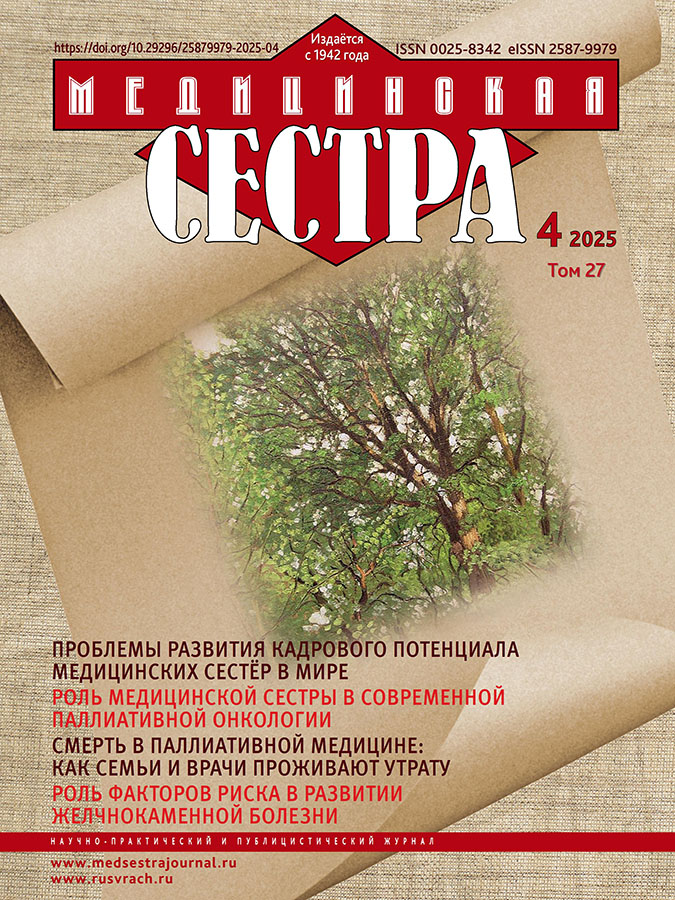Formation of professional competence among students of special skills "Obstetric business" in the conditions of practical-oriented training in college
- Authors: Savina L.V.1, Ponkina N.P.1, Sizova T.V.1, Chiglintceva E.V.2
-
Affiliations:
- St. Petersburg State Budgetary Professional Educational Institution "Midwifery College"
- Saint Petersburg State Budgetary Institution of Healthcare "City Hospital # 40 of Kurortnyi region"
- Issue: Vol 27, No 4 (2025)
- Pages: 38-41
- Section: Education: problems and solutions
- URL: https://journals.eco-vector.com/0025-8342/article/view/685232
- DOI: https://doi.org/10.29296/25879979-2025-04-09
- ID: 685232
Cite item
Abstract
The article discusses the importance of practice-based training as a means of professionalizing future midwives. Competence and professionalism of specialists are the main requirements of a modern employer. It is important for the future medical worker to realize the practical significance of the studied material, to maintain the perspective of his professional activity, master new technologies, present the difficulties of medical work and be ready to overcome them. This is the main purpose of the practical approach to the training of future medical workers. The successful development of a professionally competent mid-level medical worker is facilitated by practical training, which is the most important direction of the educational process in a medical college. Practice-oriented training is implemented in practical classes, training and production practices. Practical exercises are the first stage where Prof. The successful development of a professionally competent mid-level medical worker is facilitated by practical training, which is the most important direction of the educational process in a medical college. Practice-oriented training is implemented in practical classes, training and production practices. Practical classes are the first stage where students have professional and general competencies, face-to-face impact on each student, forms of education based on medical ethics and deontology are developed.
An important place in practical classes is occupied by training in practical manipulations on modern phantoms and simulators. Multiple repetition of practical manipulation according to the algorithm contributes to its mastery to automatism. The introduction of simulation training in professional activities helps to develop clinical and practical experience without risk to the patient. The next stage of practice-oriented training for future midwives is the training practice, which is carried out after the study of interdisciplinary courses that are part of professional modules.
It is aimed at acquiring initial practical experience and takes place in preclinical offices, as well as in clinical conditions in obstetric institutions, where the teacher calls students with the organization of the work of structural units of the obstetric hospital, antenatal clinic, students acquire skills in communicating with patients and performing the studied practical skills in examining pregnant women, women in labor, childbirth and gynecological patients. Such classes contribute to the development of professional competencies and responsibility for the result of their activities.
After studying each professional module, students undergo practical training, which is aimed at strengthening, deepening and systematizing the knowledge and skills acquired by students in the process of theoretical and practical training. Production practice is carried out at the bases of obstetric hospitals in the city. In the process of practicing the vocational module, students master the main types of professional activities of a midwife/obstetrician, improve the ethical and deontological aspects of communication with patients and medical personnel.
The final stage of practical training is pre-graduation practice. During 4 weeks at the workplace in the obstetric hospital and antenatal clinic, students improve their knowledge, gain experience of independent work of the future midwife.
Thus, a practice-oriented approach in the training of secondary medical professionals creates the conditions for the training of a competent medical specialist.
Full Text
About the authors
Lyudmila V. Savina
St. Petersburg State Budgetary Professional Educational Institution "Midwifery College"
Email: ponkinan@bk.ru
ORCID iD: 0000-0002-2996-1388
SPIN-code: 2001-1620
teacher of professional modules
Russian Federation, St. PetersburgNadezhda P. Ponkina
St. Petersburg State Budgetary Professional Educational Institution "Midwifery College"
Author for correspondence.
Email: ponkinan@bk.ru
ORCID iD: 0009-0008-7124-7760
SPIN-code: 9686-0144
teacher of professional modules
Russian Federation, St. PetersburgTatyana V. Sizova
St. Petersburg State Budgetary Professional Educational Institution "Midwifery College"
Email: ponkinan@bk.ru
ORCID iD: 0009-0001-4359-6081
SPIN-code: 1948-8160
teacher of professional modules
Russian Federation, St. PetersburgElena V. Chiglintceva
Saint Petersburg State Budgetary Institution of Healthcare "City Hospital # 40 of Kurortnyi region"
Email: ponkinan@bk.ru
ORCID iD: 0009-0006-6619-9798
therapist
Russian Federation, St. PetersburgReferences
- Aksenova L.N., Morozov I.V. Peculiarities of teaching methods providing the formation of professional competence in future specialists. Narodnaya gazeta. 2019; (6): 77–81.
- Istomina V.V. On practice-oriented learning in secondary vocational education. Innovatsionnoe razvitie vocational'nogo obrazovaniya [Innovative development of professional education]. 2019; 21 (1): 23–29
- Shchedrina, T. T. Features of training students of medical college in the conditions of application of simulation training. Pro-problems and prospects of education development: materials of VIII Intern. scientific conf. (Krasnodar, February 2020). Krasnodar: Novatsiya. 2020. 234 с.
- Afanasyeva E.G. Formation of general competences in students of secondary vocational education institutions in the process of professional activity. Izvestiya VGPU 2016; 110 (6).
- Khusaenova A.A., Nasretdinova L.M., Bogdanov R.R. Role of educational and industrial practice on the basis of medical organisations in the formation of clinical experience of the future specialist-medic. Ob-razovanie i upbringing. 2016; 9 (4): 52–54.
Supplementary files






